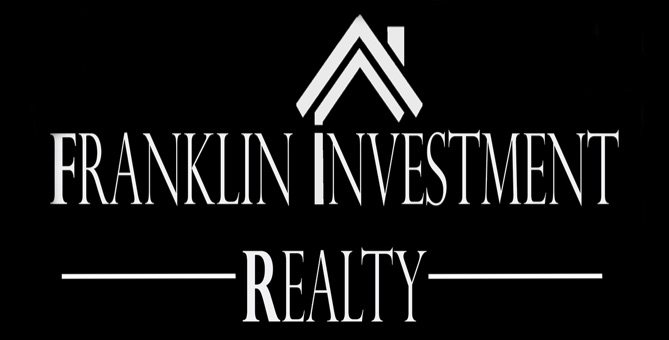A Complete Guide for First-Time Homebuyers
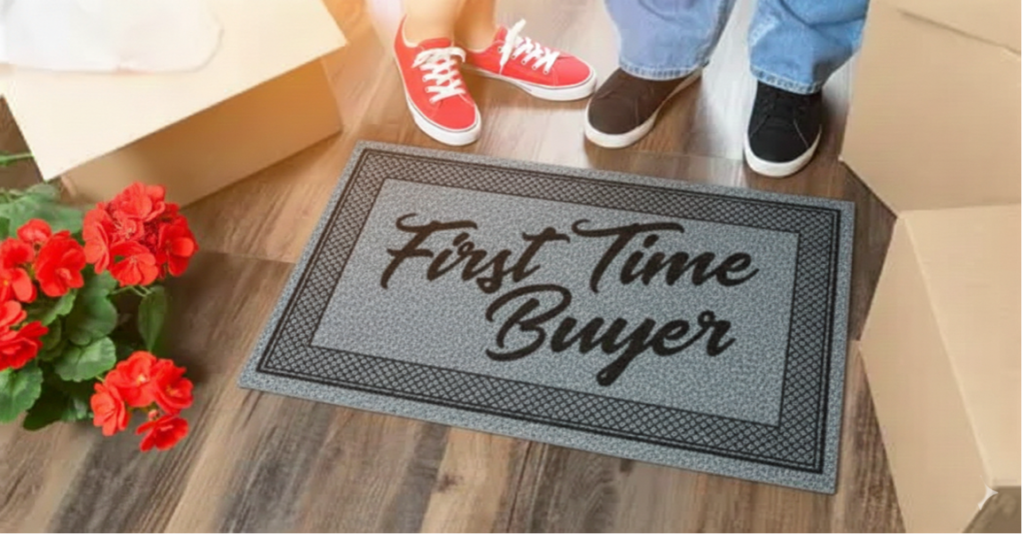
Buying your first home is exciting but it can also feel overwhelming! Between financing, home searches, inspections, and closing paperwork, there’s a lot to navigate. The good news? With the right preparation and guidance from a professional, the process can be smooth and rewarding! If you’re a first-time home buyer, you will want to read this. This guide will walk you through step-by-step what to expect and how to get started with confidence. Step 1: Understand What You Can Afford Before you begin scrolling through listings on Zillow or Realtor.com late at night, picturing yourself in your dream home pause and determine your budget first. Your affordability depends on: Income Monthly debts Credit score Down payment amount Current interest rates Most lenders recommend keeping your monthly housing payment below 28–30% of your gross monthly income. Pro Tip: Use a mortgage calculator to estimate payments but talk to your lender for accurate numbers specific to your market. Step 2: Get Pre-Approved for a Mortgage Pre-approval is one of the most important steps in the buying process. A pre-approval: Shows sellers you’re serious Gives you a clear price range when searching for homes Strengthens your offer in competitive markets In a competitive market, it’s important to understand that many sellers won’t even consider an offer without a pre-approval letter. Step 3: Explore First-Time Buyer Programs Did you know there are special programs available to first-time homebuyers? You may qualify for: Low down payment loans (FHA, VA, USDA) Down payment assistance programs First-time home buyer grants State or local housing incentives Always check with your state/city, as there may be local programs specifically designed to help new buyers like you enter the market. Step 4: Start Your Home Search Now comes the fun part, house hunting! When searching for homes in your city, consider: Neighborhood and commute School districts (even if you don’t have children, school district impacts resale value) Property taxes HOA fees Future development in the area Make a list of: Must-haves (location, number of bedrooms/bathrooms, budget cap) Nice-to-haves (pool, large yard, updated kitchen) Try to stay flexible and realistic. No home is 100% perfect but the right one should check off most of your important boxes. Step 5: Make a Competitive Offer Once you find the right home, your agent will help you submit an offer. Buckle up! Your offer will include: Purchase price Earnest money deposit Contingencies (inspection, appraisal, financing) Estimated closing date In a competitive market, you may need a strong offer strategy to stand out. Step 6: Inspection and Appraisal After your offer is accepted, the home enters escrow. Home Inspection A professional inspector checks the property for structural, mechanical, and safety issues. If concerns arise, you may negotiate repairs or credits. Appraisal Your lender orders an appraisal to confirm the home’s value matches the purchase price. If the appraisal comes in low, your agent will guide you through options such as renegotiation or adjusting your financing. Step 7: Closing on Your First Home Closing typically takes 30–45 days from accepted offer to final signatures. Congratulations, you did it! At closing, you’ll: Sign loan documents Pay closing costs Receive the keys Closing costs usually range from 2–5% of the purchase price and may include lender fees, title insurance, and escrow fees. Common First-Time Buyer Mistakes to Avoid Even smart buyers can make avoidable mistakes but don’t be caught in one! Here are a few to watch for: Skipping pre-approvalThis can delay your purchase or weaken your offer. Draining your savingsLeave room for moving costs, furniture, and emergency repairs. Making large purchases before closingAvoid new credit cards, car loans, or big purchases, they can affect your loan approval. Ignoring resale valueThink long-term. Even your first home is also an investment. Is Now a Good Time to Buy? Ah… the question we’re asked more times than we can count. While market conditions may shift, the “right time” often depends more on your financial readiness than timing the market perfectly. If you: Have stable income Plan to stay in the home for several years Are financially prepared It may be the right time for you! A local real estate professional like me can help you understand inventory levels, pricing trends, and negotiation strategies specific to your area. Ready to Buy Your First Home? Buying your first home doesn’t have to be stressful. With the right guidance and a clear plan, you can move forward confidently. If you’re thinking about purchasing your first home, let’s talk. I’ll walk you through every step; from pre-approval to closing day and make sure you feel informed and empowered throughout the process. Contact us today to schedule a complimentary first-time buyer consultation. When you’re ready to get started with the process of selling or buying, get in touch with the team at Franklin Investment Realty! – Brianna Roth
Refresh and Resell: Practical Ways to Make Your Older Home Shine for Modern Buyers

Before After Selling an older home doesn’t mean settling for a dated look. With thoughtful updates and a few strategic improvements, you can create a modern, inviting atmosphere that connects with today’s buyers while celebrating your home’s character. Key Takeaways Before You Start ● Update key rooms like kitchens and bathrooms for maximum impact. ● Refresh curb appeal with clean lines and natural tones. ● Upgrade lighting, fixtures, and systems for a modern touch. ● Focus on efficiency; smart thermostats and insulation win big. ● Present the home as clean, bright, and easy to personalize. Reimagining First Impressions Curb appeal matters more than ever. Fresh exterior paint, neat landscaping, and modern house numbers can dramatically change how buyers feel before they even step inside. Simplify your home’s exterior with less ornate trim, more subtle contrasts, and well-placed lighting. These quick changes make a lasting impression without breaking the budget. The Hidden Value in Efficiency Many older homes lose value not because of aesthetics but because of energy inefficiency. Buyers today are savvy, they ask about heating costs, insulation, and airflow. Upgrading these unseen systems quietly boosts value and comfort while showing you’ve cared for the home. Smart Upgrades to Improve Efficiency Here are simple yet effective improvements that modern buyers appreciate: ● Replace traditional bulbs with LEDs throughout the home. ● Add or improve attic and wall insulation to stabilize temperature. ● Install programmable thermostats for energy savings. ● Seal around windows and doors to eliminate drafts. ● Replace older appliances with high-efficiency models. These subtle shifts make your home feel modern even before buyers notice the design details. Update with Quality Plumbing Features Outdated plumbing can quietly turn off potential buyers—even when the rest of the home shines. Swapping in new fixtures isn’t just about aesthetics; it’s about showing your home functions well and won’t come with hidden repair surprises. Whether you’re updating a faucet or rethinking a full bathroom setup, today’s buyers want reassurance that the water runs clean, the pressure is reliable, and the systems behind the walls are sound. If you’re ready to start, check out the available plumbing supply options that suit a range of budgets and home styles. A few smart upgrades can signal to buyers that your home isn’t just charming—it’s dependable. Declutter, Refresh, and Rebalance When preparing an older home for showings, the goal is simplicity with warmth. Remove clutter, but leave enough personality for buyers to imagine themselves there. Balance nostalgia with modern minimalism; keep meaningful elements, but present them cleanly. Home Prep Checklist for Interiors Before open houses or photography, walk through with this quick guide: Remove dark or heavy drapes to let in natural light. Repaint walls in neutral, warm tones like white, beige, or greige. Replace worn carpets with lighter rugs or polished flooring. Simplify wall art to highlight space and light. Use plants or subtle décor to add freshness without clutter. These easy steps make even an older layout feel open, bright, and inviting. Small Details That Make a Big Difference A few targeted updates can transform the feel of your entire home. Replacing outdated cabinet hardware, installing modern light fixtures, or refinishing original hardwood floors instantly boosts perceived value. Upgrade Type Buyer Perception Boost Typical ROI New kitchen hardware “Feels fresh and move-in ready” 70–80% Refinished hardwood floors “Premium, well-cared-for space” 90% Fresh exterior paint “Neat and well-maintained” 60–70% Energy-efficient windows “Smart and sustainable” 75% Updated lighting “Bright and contemporary” 60% FAQ Here are a few frequent questions homeowners ask before putting their property on the market. Should I renovate completely before selling?Not necessarily. Target visible upgrades with high visual and emotional impact, especially kitchens, baths, and lighting. Are original features still valuable?Absolutely. Restored woodwork or vintage tile adds character that buyers can’t find in new builds. Preserve, don’t replace, when possible. Do small upgrades really influence offers?Yes. Even minor cosmetic updates signal to buyers that the home is well cared for and ready to live in. Wrapping It All Up Modern buyers appreciate homes that blend old-world character with everyday comfort. With targeted updates, efficient systems, and thoughtful presentation, you can make your older home feel refreshed without losing its charm. By focusing on modern efficiency and timeless details, your property won’t just attract interest, it will stand out as a move-in-ready gem that bridges past and present beautifully. When you’re ready to get started with the process of selling or buying, get in touch with the team at Franklin Investment Realty! – Shirley Martin
How to Refresh and Enhance an Investment Property for Greater Appeal and Value

Owning an investment property isn’t just about holding real estate; it’s about continuously improving its appeal to attract quality tenants, reduce vacancies, and boost long-term value. Whether you’re preparing for resale or optimizing for rental returns, smart updates can make a measurable difference. Quick Takeaways ● Focus on improvements that balance cost with return—small aesthetic upgrades can yield big impacts. ● Curb appeal sets the first impression; interiors seal the deal. ● Energy efficiency upgrades appeal to modern renters and buyers. ● Financing upgrades with rental-based loans can accelerate ROI. ● Regular maintenance and design refreshes preserve both property value and brand. Rethink the Curb Appeal The exterior of your property shapes perceptions instantly. A tired façade or unkempt landscaping can reduce value before potential tenants even step inside. Simple improvements can dramatically change that narrative. Key Exterior Enhancements ● Repaint or pressure wash the façade for a fresh, clean look. ● Replace outdated exterior lighting with energy-efficient fixtures. ● Install modern house numbers and a new mailbox. ● Refresh landscaping; consider native plants and defined pathways. ● Repair fencing and entry gates to reinforce security and style. These updates not only improve aesthetics but also signal proper upkeep—something both appraisers and renters notice. Modernize the Interior Without Overspending Inside, focus on high-impact, budget-friendly changes. You don’t have to gut the kitchen to modernize it. Small updates in key areas can transform the feel of a space. Before diving in, consider this rule of thumb: every dollar should either increase rentability or long-term property valuation. Upgrade Type Typical Cost Range Potential ROI Tenant Appeal Paint & Trim Refresh $1–$3 per sq. ft. 80–100% Broad New Flooring (LVP) $2–$5 per sq. ft. 70–90% High Kitchen Hardware/Fixtures $100–$300 80% High Bathroom Vanity Replacement $500–$1,500 75% Medium Energy-Efficient Appliances $1,000–$2,500 60–85% Very High Financing Upgrades Strategically Smart investors know that the best improvements often pay for themselves—but financing those upgrades efficiently is key. One powerful option is a Debt Service Coverage Ratio (DSCR) loan, which lets you qualify for property improvements based on your rental income, not your personal income. According to this overview of DSCR loan requirements, lenders calculate a DSCR by dividing monthly rental income by total monthly property expenses (mortgage, taxes, insurance). A ratio of 1.00 or higher means the property generates enough to cover its costs, making it easier to secure financing for: ● Cosmetic upgrades like new flooring or paint ● Durability enhancements such as roofing or insulation ● Tenant-attracting improvements like energy-efficient systems or updated kitchens This financing flexibility empowers investors to make timely, ROI-positive updates without straining personal cash flow. Improve Functionality and Efficiency Tenants and buyers are drawn to comfort, convenience, and lower operating costs. Functional improvements pay off long after the upgrade. How to Make It Work for You ● Upgrade insulation or add smart thermostats to cut energy costs. ● Install modern LED lighting with motion sensors in shared areas. ● Replace old plumbing fixtures to prevent leaks and water waste. ● Ensure ample storage; built-ins and closet systems always impress. ● Consider layout adjustments to open space or improve natural light. These upgrades not only enhance livability but often qualify for tax incentives or green certifications, improving resale appeal. How-to Checklist: Refreshing for Maximum Value Use this quick guide to ensure each improvement serves a strategic purpose. ● Conduct a professional inspection to identify structural or mechanical priorities. ● Define your budget and expected return on each upgrade. ● Prioritize curb appeal and high-traffic interior areas first. ● Choose timeless finishes and neutral colors for broader market appeal. ● Incorporate energy-efficient or low-maintenance materials. ● Document all improvements for appraisal and future resale. Following this checklist ensures every upgrade contributes to either immediate rent growth or long-term equity. FAQs: Real-World Investor Concerns Investors often face similar questions when planning a property refresh. Here’s what you need to know. How often should I renovate a rental property?Most investors refresh interiors every 5–7 years, aligning with major tenant turnovers or market shifts. Frequent minor updates—like new paint or fixtures—can extend the time between full remodels. What renovations add the most rental value?Kitchen and bathroom upgrades consistently lead ROI charts. However, adding in-unit laundry, durable flooring, and improved lighting can also justify higher rents. Is it worth upgrading before refinancing?Yes. Even modest improvements can increase appraised value, helping you qualify for better loan terms or higher equity withdrawal through refinancing. Should I DIY or hire professionals?Cosmetic upgrades like painting or landscaping can be DIY-friendly, but electrical, plumbing, or roofing work should always be handled by licensed pros to maintain compliance and safety. How do I know if an upgrade is overcapitalizing?Compare your property’s post-renovation value with similar local listings. If your upgrades push total investment far above comparable values, scale back or redirect funds toward universal improvements. Do sustainability upgrades really matter to renters?Absolutely. Eco-conscious tenants often prioritize energy efficiency, and features like smart thermostats and LED lighting can reduce utility costs—an attractive perk that keeps properties competitive. The Bottom Line Refreshing an investment property doesn’t require a full-scale renovation—just intentional, ROI-driven updates. Focus on visibility, functionality, and sustainability. Whether financed through traditional means or a DSCR loan, the goal remains the same: to create a property that feels modern, efficient, and undeniably valuable for tenants, buyers, and your long-term portfolio. When you’re ready to get started with your first investment property, get in touch with the team at Franklin Investment Realty! – Jason Kenner
How Homeowners with Low-Interest Mortgages Can Fight Against An Uncertain Future
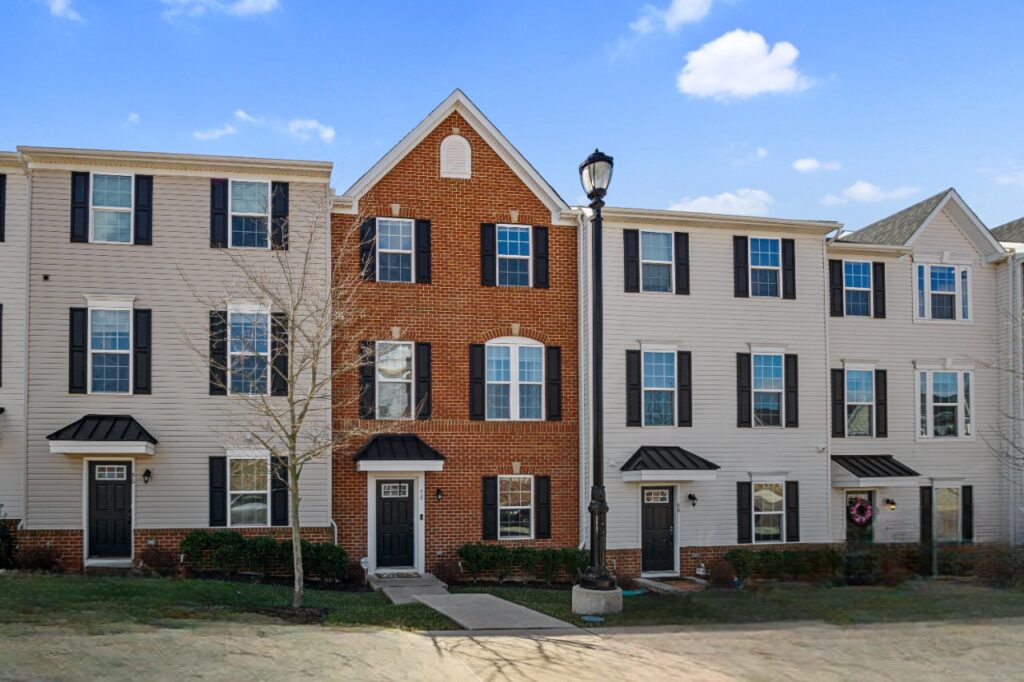
If you were lucky enough to secure a mortgage when interest rates were at rock-bottom levels, you may have felt like you won the financial lottery. A 30-year fixed loan at 3% or less meant affordable monthly payments, long-term stability, and the flexibility to build wealth through homeownership. But now, as mortgage rates have more than doubled, that once-celebrated deal has turned into a financial anchor. Fewer homes are being listed, buyers are struggling with affordability, and the real estate landscape has fundamentally shifted. But while the challenges are real, so are the opportunities. If you feel financially trapped in your home, there are ways to navigate these market conditions—without making costly mistakes. Why Higher Borrowing Costs Have Frozen the Market At the heart of the issue is the “lock-in effect.” When homeowners hold mortgages with rates far below current market levels, the financial incentive to sell and buy again disappears. Imagine trading a 3% mortgage for one at 7%—your monthly payment could skyrocket, even if you’re buying a similar home. This has led to a historic drop in housing inventory, making it harder for buyers to find properties and reducing overall sales activity. Many homeowners who would have normally moved by now—whether upgrading, downsizing, or relocating—are simply staying put. Tapping Home Equity Without Selling If moving isn’t an option but you need cash for renovations, debt consolidation, or other financial needs, your home’s equity can be a powerful tool. Home equity loans and home equity lines of credit (HELOCs) allow you to borrow against the value of your home, often at lower interest rates than personal loans or credit cards. While borrowing costs have risen, they are still far lower than what you’d face with a new mortgage. If you’re looking to make your current home work for your evolving needs, using home equity to fund a renovation or expansion may be a smart alternative to selling. Turning Your Home Into an Investment Property For those who want to move but can’t stomach today’s high mortgage rates, converting your current home into a rental property might be worth considering. With low supply pushing up rents in many markets, you could generate passive income while securing a new home under different financial terms. This strategy works best if your low mortgage rate allows you to cover your loan payments with rental income, or if you’re in a high-demand rental market. However, being a landlord comes with responsibilities, so it’s important to factor in management costs, taxes, and potential vacancies before making the leap. Creative Financing: Alternative Ways to Buy Your Next Home If selling and buying a new home is unavoidable, consider alternative financing options to minimize the sting of higher interest rates. Adjustable-rate mortgages (ARMs), which offer lower initial rates that adjust after a set period, could provide short-term relief—especially if you expect rates to decline in the coming years. Some lenders and homebuilders are also offering rate buydowns, where they reduce the interest rate on your loan for the first few years to help with affordability. While these options require careful planning, they can be effective for buyers who anticipate future financial flexibility. Waiting Out the Market: How Long Until Conditions Improve? For homeowners willing to be patient, market conditions may eventually shift in their favor. If inflation cools and the Federal Reserve begins to ease interest rates, mortgage rates could decline in the coming years, making moving more financially viable. Additionally, a slowing housing market may lead to price adjustments, potentially creating better opportunities for buyers down the line. In the meantime, improving your financial position—paying down debt, boosting your savings, and strengthening your credit score—can put you in the best possible position for when the market becomes more favorable. Earn Some Extra Cash With rising costs putting pressure on household budgets, starting a small business can be a smart way to generate additional income and build long-term financial security. Whether it’s a side hustle or a full-time venture, launching a business requires careful planning—developing a solid idea, researching your market, and handling the legal essentials. One of the best steps you can take is forming a Limited Liability Company (LLC), which protects your personal assets if your business runs into legal or financial trouble. While hiring a lawyer to handle the paperwork can be expensive, you can register your Pennsylvania LLC through a highly rated formation service to streamline the process at a fraction of the cost. By keeping startup expenses low and structuring your business properly, you set yourself up for success without unnecessary financial strain. Being locked into a low mortgage rate in a high-rate environment can feel frustrating, but it’s also a reminder of the financial advantage you hold.. Until market conditions shift, the best approach is to stay informed, plan strategically, and make the most of the home you’re in. When you’re ready to get started with the process of selling or buying, get in touch with the team at Franklin Investment Realty! – Shirley Martin
From Property to Progress: Turning Real Estate into Education Equity

From Property to Progress: Turning Real Estate into Education Equity In an era where financial challenges often hinder educational pursuits, innovative solutions are more essential than ever. Blending academic analytical skills with practical real estate investment experience creates a powerful approach to funding education. This guide explores house flipping to support your educational goals while building knowledge of property markets and business strategies. It provides a comprehensive roadmap to expand property reach through digital tools, increase home value through strategic upgrades, and effectively balance studies with a growing house-flipping business. Expanding Your Real Estate Network with Digital Innovation Returning to school as an adult can be daunting, especially considering the financial implications. However, flipping houses can be a lucrative way to fund your education. To maximize your property’s reach, leverage modern digital tools. Utilize immersive technologies like virtual reality tours and 3D imagery to provide potential buyers with an engaging experience. These tools allow buyers to explore homes in detail from their current location, making informed decisions without physically visiting the property easier. Also, social media platforms offer targeted advertising options, enabling you to reach specific demographics based on income, geographic location, and interests. Blending Education and Business with E-Learning Solutions Online degree programs offer a flexible and budget-friendly solution when juggling house flipping with returning to school. Unlike traditional on-campus courses, online learning allows you to tailor your study schedule around your business demands. Pursuing effective cybersecurity programs enhances your understanding of safeguarding digital assets and offers strategic advantages at a lower cost. This dual approach is beneficial as these programs are typically more affordable than traditional education, allowing you to advance your business skills without sidelining your real estate projects. Enhancing Appeal with Green Home Innovations Enhancing your property’s value is crucial for a successful flip. Consider incorporating energy-efficient features to attract environmentally conscious buyers. Simple upgrades like installing smart lighting or switching to energy-efficient appliances can make your property more appealing. Not only do these upgrades reduce energy consumption, but they also offer a reduction in utility bills, ranging from 5% to 30% annually. This makes your home both economical and attractive. Harmonizing Academia and Real Estate Ambitions Balancing house flipping with your academic goals requires careful planning. Setting achievable goals and maintaining realistic expectations are key. The fix and flip market in 2024 highlights the importance of a well-thought-out approach. By researching property values and neighborhood trends, you ensure sound investments that can yield substantial returns to help finance your education. Efficient scheduling is essential; it helps manage your time effectively, reducing holding costs and study-related stress. Elevating Home Potential Through Smart Renovations Strategic renovations are essential for enhancing property value while keeping costs in check. Update siding or garage doors to focus on curb appeal, which can yield a significant return on investment. Modernizing kitchens and bathrooms can greatly increase functionality and appeal inside. A midrange bathroom remodel, for example, can recoup nearly 67% of its cost. By prioritizing these targeted improvements, you increase your property’s desirability and market competitiveness, making it an intelligent choice for quick and profitable reselling. Tapping Into Local Market Dynamics for Optimal Returns Evaluating local property market values is crucial when flipping houses to finance your education. Analyzing these markets helps identify investment opportunities where properties are undervalued or poised for appreciation. Staying informed about asking prices provides insights into seller expectations and potential resale values. This knowledge equips you to make informed decisions, maximize financial gains, and support your academic endeavors. Navigating the Legal Landscape in Real Estate Deals Understanding contractual obligations is crucial in house flipping. Ensure a legally binding agreement where both parties sign, protecting your interests and minimizing disputes. Clearly define the terms of sale, including price, closing date, and any necessary contingencies, to establish a transparent transaction process. Including dispute resolution provisions helps maintain smooth business operations and safeguards against potential legal challenges. Embracing house flipping to finance your education is more than a financial strategy—it’s a transformative journey that weaves together the pursuit of knowledge and entrepreneurial acumen. As you engage with academic and real estate challenges, you build a foundation that bolsters your bank account, confidence, and expertise. The skills you acquire from analyzing markets, negotiating deals, and executing renovations are assets that transcend the classroom. Tapping into the symbiosis of house flipping and academic growth can unlock the potential for financial independence and a deeper understanding of the synergy between education and enterprise. Discover your dream home with Franklin Investment Realty, where over 30 years of expertise in the Greater Philadelphia area will ensure a seamless buying and selling experience! – Shirley Martin
Tips and Advice for Maintaining a Home

One of the most important parts of owning a home is taking the time to maintain it, so it lasts longer and looks fantastic. Many have fallen behind on the art of home maintenance, but it’s never too late to start! If you follow these simple small tips, you can keep major problems from happening down the line. Check Pavers and Concrete This step is easy to do when following through with other lawn work or outside chores. Simply look at the ground pavers, sidewalk, and driveway on your property and make sure it’s in good condition. If you see any cracks, it’s vital that you get these repaired as soon as possible. When winter sets in, moisture can gather in these cracks and then expand as it freezes and crack further. The average winter season goes through countless thaw and freeze cycles, so a tiny crack could break an entire paver in half by the time spring arrives. Clean Showerheads and Taps This step is easy to do and should be done once every month to two months, depending on how much use the faucets and showerheads are getting. To do this, mix baking soda and water and apply this paste directly to the shower head and tap. Let the paste sit for around thirty minutes, and then wash it off by turning on the tap and wiping it with a clean cloth. If you want to take it further on taps, you can remove the filter to make sure there’s no build-up, but this isn’t as necessary. Ensure Features Are in Great Condition The features on the exterior of your home are important because they’re often the first part of your property that anyone sees. Check areas like your mailbox, patio, and lawn to make sure whatever features you have are well-maintained. From replacing a cracked birdbath to looking at new mailboxes because yours is old and rusted, it’s easy to make a small change that will freshen up your lawn and keep your property value high. Help Your HVAC System Run Smoothly Your HVAC system is the main thing that keeps your property comfortable through every season. Although it can be an added expense if you don’t already do this, it’s a good idea to take care of it and take steps like swapping out the filters every month or so. Beyond that, consider putting in a radiant heating thermostat so you can better control the temperature of your home. If your home has two floors, you may want to consider putting in a second unit to control the top floor separately. Heat rises, and if you try to heat your entire home evenly, you could be facing a lot of problems. Check Security Features Often Security features can make a huge difference in how safe you feel at home. This means going through and checking if your window locks, garage door, and external door lock all function correctly. If you have a doorbell camera, make sure the batteries on that stay charged and that it’s able to do its job without interruption. Install Attractive and Durable Updates When you’re updating your property, look for both quality and attractive features. This could mean manufactured stone panels that will last for years and look fresh, or it could mean updating to triple-paned windows to block out the weather and harsh conditions. If you’re unsure about a brand, don’t be shy to shop around and look at reviews. You want what’s best for your property, so it’s worth the extra legwork. Ensure Windows and Doors Don’t Leak One of the most devastating blows to any property is if there’s an air leak. This can ruin your electricity bill, allows extra moisture into your home, and can even invite insect life into your property. The best way to check if your windows and doors are leaking is to take a lit candle and carefully carry it near doors and windows while they’re closed. If you see the flame pull strongly one way or another when near an opening, that door or window needs a better seal. If all of your windows or doors are leaking, it might be time to replace them fully, depending on your budget. Keep Your Gutters and Roof Clear How often do you clean your gutters and roof? If you don’t currently have gutter guards, it’s a good idea to consider them since the average homeowner needs to have their gutters cleaned two to three times a year, depending on tree coverage and species. This can be dangerous for the homeowner to take on and expensive to have professionals complete. Your Home Can Run Smoothly When Well Maintained By taking the time to create a plan for yourself and keep up with maintenance, you can help your property last longer and look amazing while it does. Follow some of these tips if you want your property to thrive! – Sam Willis Sam Willis is a freelance writer that loves sharing his knowledge and expertise on real estate. He lives in Atlanta, Georgia where he enjoys spending time with his wife and researching real estate trends in his free time. Sam’s work as a freelance writer can be found on Building Product Advisor, a new construction industry resource launching in Fall 2022.
Your Home Renovation Starter’s Guide
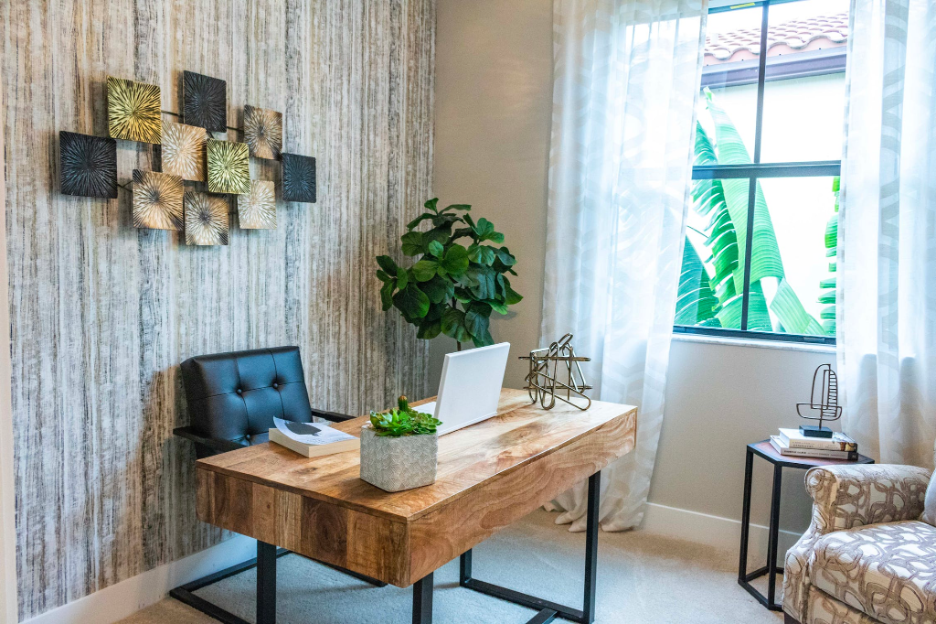
Home renovations can be a very daunting task. There are many things to consider, from the initial design stages to the finished product. Homeowners need to be well-informed about the process to make the best decisions for their families and homes. Here we outline a few things to keep in mind when planning a home renovation. Should You Add An Addition to Your Home? One popular home renovation is to add an addition. This can be a great way to create additional living space, but Fixr.com notes that it’s essential to consider the costs and the impact on your home’s resale value. If you’re planning on selling your home soon, an addition may not be the best option. You’ll need to hire a contractor with experience in major home renovations. Remember that this renovation can disrupt your daily life, so plan accordingly for the construction noise and mess. As with the other types of renovations listed here, you can expect your contractors to use various software like estimating apps and construction management software, such as with this solution. Contractors can use construction software with a built-in customer relationship management (CRM) system so they can easily communicate with customers in one place while tracking responses and follow-ups. This is good news for you, as you can expect correspondence with your contractors to be efficient and timely. Add a Home Office A common reason for wanting an addition is to add an extra room or two, such as a home office. This can be a great way to create a dedicated workspace, but it’s essential to look at the noise level and lack of privacy if your office is near a high-traffic area of your home. When reviewing locations, consider an area with lots of natural light. If that’s not possible, adding skylights or extra windows is an excellent way to brighten the space. Basement Renovations Another popular home renovation is to finish or remodel your basement. This can be a great way to add extra living space, but it’s essential to consider the costs and the impact on your home’s resale value. Many homeowners finish their basements for enjoyment, but it’s still necessary to factor in the prices of materials and labor. If you’re planning on selling your home soon, a basement renovation may not be the best option. HVAC and Roofing Two essential elements of any home renovation are the HVAC system and the roof. These are two of the most expensive and complex systems in your home, so it’s essential to consult with a professional before making any changes. Many homeowners choose to upgrade their HVAC system when they renovate, which, as Pendley Heating & Air Conditioning points out, can save money on energy bills. The roof is another essential element to consider. A solid roof is necessary to protect your home from the cold and snow. If your roof is over twenty years old, it’s a good idea to have it inspected by a professional and complete any necessary repairs. New Windows and Doors Another critical aspect of any home renovation is the windows and doors. The weather this time of year can be brutal, so it’s essential to have good quality windows and doors to protect your home. If your home is over twenty years old, the windows and doors are likely outdated and may be in need of replacement. Many homeowners choose to upgrade their windows and doors to energy-efficient models, which can save money on energy bills. Home Renovations Are An Investment Home renovations are a significant investment, both in time and money. If you’d prefer to buy a new home with a stellar home office, contact Franklin Investment Realty for help finding the perfect location. Philadelphia-based Franklin Investment Realty provides clients with a range of experience whether it’s a purchase of a home to occupy or a property to buy within your self-directed IRA. Contact us today for more info! (215) 382-7368 – Shirley Martin
How Adding a New Deck Can Increase a Home’s Value
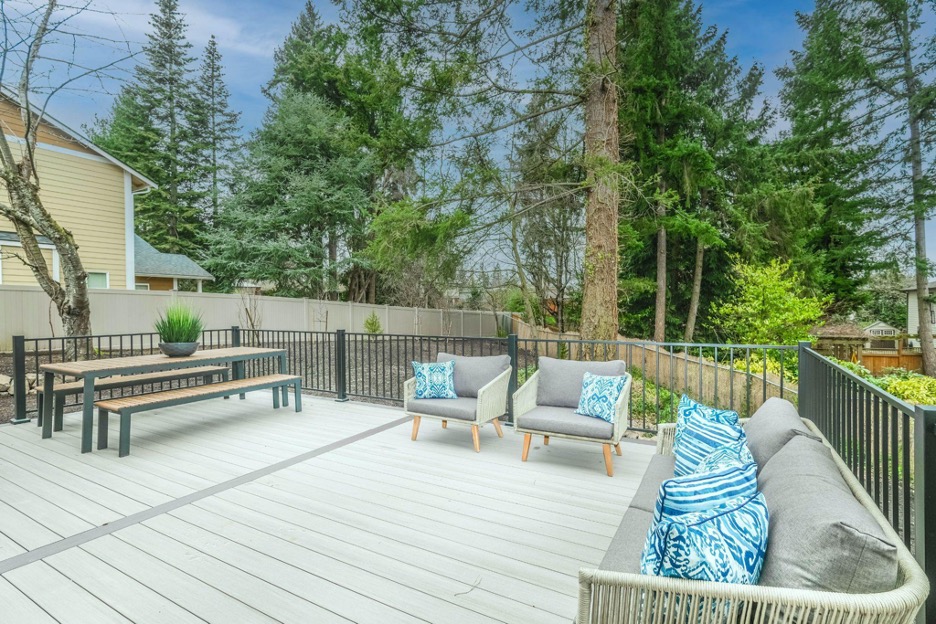
Your home’s exterior can make a huge difference in the number of people interested in your home: and how much it’s worth. If you’re interested in boosting the price of your property and aren’t afraid to put in a little extra work, here’s how adding a deck can increase your home’s value! Add Visual Appeal Visual appeal is one of the biggest reasons to add a new deck! Not only does a new deck look fantastic, but you can paint or stain it any color you want. This allows for a custom and gorgeous look that will set your lawn apart from anyone else’s. This type of addition is especially valuable if your lawn is otherwise unremarkable or has low spots that gather water near your home. The deck will give you a dry and comfortable place to sit and a way to hide drainage as you guide this water away from your property. Increase Usable Outdoor Space Since 2020 there’s been a large emphasis on usable exterior spaces that allow homeowners to get the most out of their homes. Instead of letting your home be uninspiring outside, you can enjoy a new and usable outdoor space that looks fantastic. This will ensure you get more benefits like vitamin D and can enjoy the fresh air. Over time this is proven to improve mental and physical health and can be awesome for everyone within your home. Affordable Materials Mean High ROI How much of a return you get on your investment depends on how much you paid for your lawn or rooftop deck and whether the market will be able to add that value to your home. Most decks add around 80% of the price of the build back into the property. Although this may not seem like a lot, if you built your deck five to ten years ago, that means you get to enjoy using it for that period of time and then enjoy selling your home for more money. Don’t cut corners, though! Get materials that are high value and able to last for as long as the future owners will need them. Can Add Square Footage to Property How large is your home? If your deck is large enough, you can often add its space to the square footage of your property. This is an incredible chance for anyone with a smaller house to spread out the area a little and possibly boost the value of their home without having to build an entirely brand-new bedroom onto the home. This can vary from state to state, so look into local laws and guidance, and work with a professional realtor before you decide to follow this update. Makes Home More Interesting to Families If you’re planning on selling your property any time soon, a deck will add a lot of valuable interest to your home. Buyers will love the idea of spending time outside with their loved ones and will instantly picture what their life will be like if they bought your home. Keeping up to date with the best polyurethane for decks you can find, and ensuring it always looks fresh and new, regardless of how old your patio is, is important as well. Nobody wants to buy a property with a rotting or old deck that they’ll have to replace or take down in a matter of years. Safer Area in Backyard In many areas, there are tons of risks within a backyard, from puppy poop to fire ants and even scorpions if you’re in a place like Arizona. Adding simple cedar deck boards and creating a gorgeous deck will give you a chance to pull up and away from your lawn. You can still enjoy it and get the most out of the outdoors without having to worry about where you’re stepping. Adding materials like hog wire deck railing makes it even safer, ensuring nobody falls or trips when they’re on your deck. Great Entertainment Space Entertainment is a must! We all love having friends and family over, so creating a space that’s not only a focal point but also attractive for your friends and family to visit will make a huge difference. You can take this even further by adding a grilling and outdoor kitchen area on your deck. Over time awesome memories will be created here, and it’ll feel like the main space of your home. It’s vital that if you do this, you ensure your wood is treated often and that your property is able to handle anything that’s thrown at it. This is especially true if you have more than ten people in any gathering on your deck. A New Deck Can Change Everything Whether you’re eager to sell soon or you’re trying to create a property that will be a great nest egg eventually- your deck matters. Add value by building this great entertainment space soon. Sam Willis is a freelance writer that loves sharing his knowledge and expertise on real estate. He lives in Atlanta, Georgia where he enjoys spending time with his wife and researching real estate trends in his free time. Sam’s work as a freelance writer can be found on Building Product Advisors, a new construction industry resource launching in Fall 2022. – Sam Willis
How to Hone in Your Home-Buying Priorities

There are a myriad of factors that you must take into account when you’re searching for a home. In addition to your budget, you need to think about how long you want to live in a home, what neighborhood is best, and what school district you want to be in. Of course, some of these considerations are more important than others — especially when you’re choosing between a starter home and your forever home. Consider these tips and help from Franklin Investment Realty to establish your priorities and make the right choice. Assess Your Plans for the Future One of the biggest factors that will influence your home search is how you envision your future. If you plan on having kids in the next few years, for example, investing in your forever home may be a better idea. It will likely be bigger, offering more room to expand your family. Along with the additional space, though, will come more need for upkeep — and a bigger price tag, too. Still, the additional cost may be worthwhile if you really want to put down roots in the area you’re shopping in. You can also avoid the hassle of moving again if you choose to invest in the home that you plan to stay in forever. Although a forever home will cost more, it could also be a wise financial move if you’re able to snag a low interest rate on your mortgage. Conversely, if your plans for the future include a home that you can rent out in a few years, a starter home may be the better bet. A starter home will allow you to build equity and then eventually turn the property into a source of income. Additionally, if you plan on staying for the long haul, it can be a good idea to explore your home warranty options. Not to be mistaken for homeowners’ insurance, a home warranty protects your home from incidentals, like appliance breakdowns or problems with essential systems like HVAC, plumbing, electrical, and more. Check out these steps to find the best home warranty provider. Decide What You Can Afford Your budget will likely be a deciding factor in whether you go for a starter home or your forever home. In most cases, a forever home will be pricier because it will be bigger than a starter home, and it may also be in a better area or have more amenities. You will need to weigh whether these additional features are worth the bigger monthly payment you’ll be faced with. Although a starter home may have a lower listing price, there may be substantial repairs or upgrades necessary to get it to the point you want. According to statistics, the average home remodel costs between $19,800 and $73,200. This is no small sum, and it could offset the savings you gained by choosing a starter home. This is especially true if you choose a fixer-upper that needs extensive repairs. Finally, you should consider how easy it will be to resell the home you choose. Life changes can happen unexpectedly, and even if you opt for your forever home, you may find yourself needing to sell it. A starter home will likely be more difficult to resell — especially if you only invest in minimal upgrades. A forever home, on the other hand, will likely attract more interest from prospective buyers. Get Your Priorities Straight Before House Shopping Finding the right house can be difficult, but it can also be rewarding when you finally find the perfect home. Before you can find the perfect home, you need to determine whether you’re looking for a starter house or a forever house — and you need to get your priorities straight. – Suzie Wilson
Durable Renovation Projects to Reduce Maintenance

Maintenance can be one of the worst parts of any property. We all want a home that will last and look great while also being cost-effective: but is that realistic without putting in a ton of constant work? It can be! These are some of the best ways to get your property into great condition and halt the need for tons of maintenance! Windows That Can Handle Anything Your windows can be the best or worst part of your property. If they’re loose and leak air, you know that your heating and cooling bill will be wildly expensive at all times. If you’re struggling with these bills, consider updating to storm windows. Not only are storm windows more likely to stay sealed for longer regardless of weather and surroundings: but they’ll also protect your property if you’re in an area that deals with hurricanes, tornadoes, or thunderstorms. Of course, storm windows cost more than the average window: but it’s worth it. Updating Your Appliances How old are your appliances? If you’ve had to call someone out to help with your dishwasher more than twice in the last year, or your oven feels like it’s letting out tons of heat and isn’t cooking your food as evenly as it used to: it could be time to update your appliances. This is an expensive fix: but you don’t have to worry about that expense for long! Going for energy-efficient appliances means that your home will be comfortable, and your electricity bills will stay lower than you’d ever expect. Replacing An Older Roof How old is your roof? An older roof will let out far more air and cause leaks, make your home more susceptible to rodent and insect life, and can be generally hazardous. If you’ve been spending years using a roof cover board and doing one-off repairs to try and make your roof last longer, it could be time to give up the chase and replace it full out. This replacement will give you the chance to kill off the amount of maintenance you need to complete on your home. Composite insulated roof panels can also boost how well your home keeps the temperature. Keeping an Eye on Your Siding How old is your siding? If you notice you have issues with ants, or your home seems to be getting a lot of noise pollution:, it could be time to update your siding. By looking at it, you can check to see if it’s warping, bent, discolored, or cracked: all signs that it’s time to update it. Updating your siding will fix a host of other issues and allow you to have a low-maintenance home with lower monthly bills to boot. Updating Your Lawn With Native Plants Plants that are native to where you live are one of the best things you can do to reduce maintenance and work on your property. These native plants will ensure your lawn doesn’t flood and, instead, the water into the soil. They can also reduce the amount of work and watering your news to do on your lawn since these plants will already be acclimated to the surroundings they’re in. Replacing an Older Garage Door How old is your garage door? An older one will be worse at keeping out moisture and insect life and can even get stuck open or closed: making it hazardous for whoever is in the garage. Replacing this door is also a home renovation project that offers the largest return on investment and gives you the chance to update your property’s look. This is a must to avoid future trouble. Repairing Cracked Concrete Cracked concrete is going to hurt you in the long run. When it goes through freeze and thaw cycles, these cracks will get larger and larger until you have to replace the entire slab. Instead of ignoring them, or working around them, consider either repairing the cracks: or replacing the pavers with some that are designed to be cracked. These come in gorgeous patterns that can allow them to move more fluidly with changes in the ground without cracking and can last longer. Swapping Carpet for Sturdier Options You may love your carpet flooring, but it’s not good for you and could be adding to how often you have to replace your HVAC filters. Carpet traps dirt, grime, and dust, and even if you vacuum, it doesn’t give up all of it. Although it may look cleaner than the average wood floor, it’s full of oils and debris that nobody should want to keep on their floor at all times. Beyond this, carpet ages quickly and can go even faster if you have pets or children. Swapping the carpet for hardwood, tile, or laminate can save you in the long run. Your Home Can Be Low Maintenance Although you may have already poured hours of work and time into your property: there’s no reason it can’t start to be lower maintenance starting today! Take the time to follow some of these tips, and make your property a dream to take care of in no time. Sam Willis is a contributor to Innovative Building Materials. He is a blogger and content writer. Sam is focused on helping fellow homeowners, contractors, and architects discover materials and methods of construction that increase property value, maximize energy savings, and turn houses into homes. – Sam Willis
